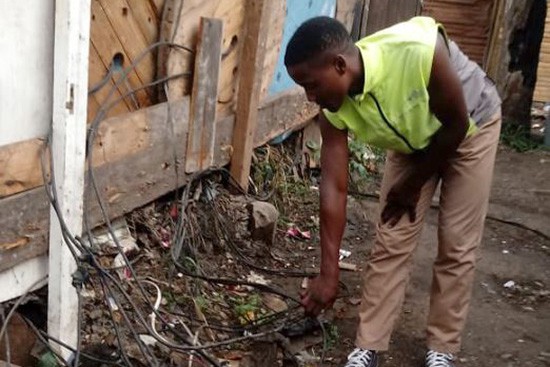“We need electricity, legal or not” says shack dweller
eThekwini Municipality is planning to roll out 18,000 new electricity connections across the city
“A few months ago, a two-year-old was electrocuted here. I could smell the flesh,” says Zuzile Sogiba, a residents at Siyathuthuka Informal Settlement north of Durban.
“Incidence like this makes you think but … we need electricity, legal or not,” says Sogiba while pointing out a pile of illegal electrical wires in a pathway between shacks in the settlement.
Siyathuthuka has become known for its frequent fires. Several people have also been electrocuted. Residents say they have been waiting “over ten years” for the eThekwini Municipality to electrify the area.
Community leader Innocent Mathaba says residents needed to be educated about the dangers of having illegal connections. “We are asking to be connected legally. I have heard that the City is planning on electrifying informal settlements, but when is it going to happen? We have been waiting for over ten years, how long should we still wait?”
Municipal spokesman Mandla Nsele told GroundUp that Siyathuthuka was one of the areas earmarked for its electrification programme. “This project is still in the feasibility process and community participation phase.”
Nsele said the project was one way for the City to curb the increasing problem of illegal connections. The City’s Revenue Protection Unit has recorded 436 illegal connections which costs the municipality more than R500 million, he said.
Nsele said the City planned to roll out 18,000 new electricity connections in different areas. He said the project’s funding and planning came from national government. “Informal settlements are an urban reality and may be the only form of housing available to many residents in the medium term. These settlements are temporary until formal housing becomes available,” he said.
Support independent journalism
Donate using Payfast

Next: Hundreds flock to occupy municipal land in Pietermaritzburg
Previous: Children “too scared to play outside” in Ocean View
© 2018 GroundUp.
This article is licensed under a Creative Commons Attribution-NoDerivatives 4.0 International License.
You may republish this article, so long as you credit the authors and GroundUp, and do not change the text. Please include a link back to the original article.

